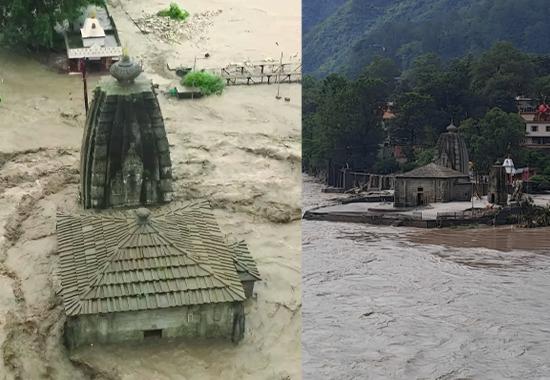Call it a miracle or an architectural marvel, the Panchvaktra temple, dedicated to Lord Shiva and known for stone carvings, in Himachal Pradesh's historical town, known as Chhoti Kashi, standing tall after flash floods triggered by heavy monsoon rain.
After remaining firm amidst the swollen Beas river that saw several flash floods in its catchment, which swallowed scores of modern concrete structures between Manali and Mandi towns, the 16th century temple built on heavy rocks has emerged as the water level receded.
The temple is situated at the confluence of the Suketi and Beas rivers.
Believers say this reminds them of the Kedarnath temple that stood tall amidst the 2013 floods in Uttarakhand.
Geological experts told IANS that heavy floods could not damage the foundation of the Panchvaktra temple, an Archeological Survey of India (ASI) protected monument.
The temple is built in the typical Shikhara architecture style.
According to legend, the Panchvaktra temple was restored by one of the erstwhile rulers of Mandi, Sidh Sen, who succeeded Gur Sen in 1678 AD, as it was damaged by floods. The main porch of the temple is supported by four carved pillars.
Inside the temple, there is a huge statue of Lord Shiva. The statue has five faces, which depict different characters of Lord Shiva -- Aghora (destructive nature), Ishana (omnipresent and omnipotent), Tat Purusha (ego), Vamadeva (female facet) and Rudra (his creative and destructive aspect).
Temple priest told IANS that after the water level receded, the temple had an accumulation of 12-13 feet of sand. "There was no damage to the statue of Lord Shiva. In fact, the entire statue of Nandi was blanketed by a 12-foot tall mound of sand. There was some damage to the outer boundary walls of the temple."
Two days back the doors of the temple were reopened for the devotees and the prayers resumed.
Former Chief Minister Jairam Thakur visited the spot when the temple was submerged in the water. "In the past 60 years, as people are telling me, they have never seen the temple submerged in the Beas waters. Even local legislator Anil Sharma is saying that in his entire life he has never heard that the temple is submerged," Leader of Opposition Thakur told the media on July 10.
He was accompanying several legislators, including local lawmaker Sharma.
Deputy Chief Minister Mukesh Agnihotri on Thursday paid obeisance at the temple along with his wife.
Expressing happiness, he said despite the deluge in the Beas river Mandi's Panchvaktra temple is fully safe. "And Lord Mahadev is seated."
Addressing the crowd in Mandi in the local dialect, Mandyali, while launching BJP's election campaign in September last year, Prime Minister Modi expressed happiness at being in Chhoti Kashi after visiting Kashi Vishwanath the same month.
In his visits to Mandi, he never missed to mention his visits to the town's Bhootnath temple and Panchvaktra temple.
Mandi is popularly known for the week-long congregation of 200 deities from hundreds of temples for the festivities of Mahashivratri.
The celebrations date back to 1526 when this town was founded during the rule of Ajbar Sen (1499-1534). He had 'invited' all the local deities to mark the founding of the new town.
